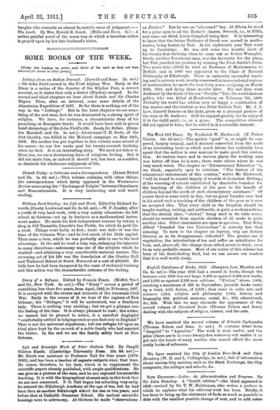The good Old Times. By Frederick W. Hackwood. (T. Fisher
ljnwin. 10s. 6d net.)—The epithet "good" is, as might be sup- posed, largely ironical, and it detracts somewhat from the merit of an interesting book on which much labour has evidently been spent that the author is over anxious to make good this conten- tion. At various times and in various places the working man was better off than he is now ; there were others where he was very much worse. The chapter on "Eleemosynary Education" is, we think, especially open to criticism. " The history of the educational endowments of this country," writes Mr. Hackwood, "will be found to consist largely of records of shameless filching; of the wresting of schools established by charitable founders for the teaohing of the children of the poor to the benefit of children beyond the needs of such eleemosynary assistance." Of course there is some truth in this, but no great founder ever had in his mind such a teaching of the children of the poor as is now an accepted idea. That every child in the kingdom should be taught reading, writing, and arithmetic, is quite a modern notion ; that the clerical class, " clerical" being used in its wide sense, should be recruited from capable children of all ranks is quite another idea. Other statements are open to question. That King Alfred " founded the two Universities" is scarcely less than amazing. To turn to the chapter on leprosy, why are dietary theories as to its disappearance ridiculed ? The greater use of vegetables, the introduction of tea and coffee as substitutes for beer, and, above all, the change from salted meats to fresh, seem to us very probable causes. Most of our notice of this volume has been of the fault-finding kind, but we can assure our readers that it is well worth study.






































 Previous page
Previous page